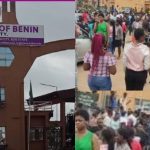By DEYEMI SAKA
It was on a ride from Zuba to Minna in 2013 that I had a very profound encounter which I will cherish for as long as I live. I’ve been in Abuja for a while and it was customary for me to go to Minna to see a boss who is always quick to remind me I’m his friend, Alhaji Moh’d Nma Kolo.
I sat in front with the driver from Suleja. He started playing a recorded khutbah, and it was one which was just about the superiority of Islam and how Christianity validates the claims by citing Bible passages and giving it his (preacher’s) interpretations. It got to a part and the driver skipped it. I asked him why he did that. He said he cannot allow it because what the preacher said about Jesus Christ is bad and he will not allow anyone to say that about Prophet Muhammed (S.A.W).
I was impressed. I commended him for his wisdom and demonstration of respect for the religious convictions and beliefs of others. We both agreed that is one thing lacking in our society and also stressed the danger of such bileful and inciting religious preachings.
Another instance is to look at what North-East, and the whole of the North has become. It’s a killing field and this is largely because of the terror activities of Boko Haram built on religious radicalisation.
It was widely acknowledged that the founder of Boko Haram, Muhammad Yusuf, was reportedly inspired by the controversial Islamic preacher Mohammed Marwa (Maitatsine), who condemned the reading of any books other than the Quran.
In one 2009 interview, Yusuf expressed his opposition not only to Western education, but to the theory of evolution, a spherical Earth, and to the idea that rain comes from “evaporation caused by the sun” rather than being created and sent down directly by God.
Boko Haram opposes the Westernisation of Nigerian society, which it blames for “Nigeria’s culture of corruption”,and demands the establishment of an Islamic state in Nigeria. It later evolved into a jihadist group in 2009. As Sunni Salafi Jihadis, the group strives to re-establish the Islamic caliphate and bring all peoples under its domain, doing away with modern states and patriotic feeling towards them. After Boko Haram declared its allegiance to the Islamic State, an IS statement proclaimed thus: “It was the rejection of nationalism that drove the mujahidin in Nigeria to give bay’ah (fealty) to the Islamic State and wage war against the Nigerian murtaddin (apostates) fighting for the Nigerian taghut (idolatrous tyrant)”.
Members’ beliefs tend to be centred on strict adherence to Wahhabism, which is an extremely strict form of Sunni Islam that sees many other forms of Islam as idolatrous.
For a state which is confronting banditry in Kontagora, suspected terrorists activities around Suleja, and for a man who is enlightened enough to appreciate the havocs religious fundamentalism have caused in other states, I must say I agree with his directive that “everyone going to sermon on Friday, should bring his scriptures for review.” The directive also has it that clerics must obtain licenses within two months.
The Niger State Government must be given credit for its information management efforts as it made clarification through the Director General of the Niger State Religious Affairs, Umar Farooq. He explained that the new directive on religious preaching is not a fresh policy but an existing law being revived as they said the law has been in place since 1985.
“We have a law in Niger State, there has been an edict law since 1985, so it’s not a new policy. The preaching law has been in existence. What we are just trying to do now is to revive the law to make it useful, so that we can have peaceful environments and avoid creating tensions,” he explained.
He further explained this will avail the state government the much-needed database for identification, monitoring and sanctioning of erring clerics who preach hate and extremism. He also made it clear it is never an attempt to silence religious leaders.
I buy into the argument that this is needed to create order and to maintain harmony in the state.
The good sign here is the understanding and the cooperation of the Christian Community, especially in the face of allegations of persecution of Christians in Northern Nigeria. The Niger State chapter of Christian Association of Nigeria, CAN, has clarified its position on the Law.
Daniel Atori, media aide to Reverend Bulus Dauwa Yohanna, Chairman of CAN, said the government’s move was misunderstood at first because the memo went viral on social media without context, creating the impression that both pastors and imams were required to submit their sermons.
“When the news first broke, many thought it covered everyone: pastors, reverends, and imams. But upon review, it became clear that the directive was mainly for Islamic clerics under the Da’awa registration,” Atori explained.
He noted that the state government introduced the regulation in response to reports of some preachers delivering inciting messages, particularly in certain parts of Niger State, where sermons were said to challenge democracy and stir up unrest.
“At the Christian Association, we discovered that the directive was not applicable to Christians. The form that is available is strictly for the Islamic community,” he said.
We are all living witnesses to the Rwanda genocide of 1994 which led to deaths of estimated one million persons in four weeks. This happened because of a broadcast of hate speech on radio in response to the April 6, 1994 air mishap. On the said day, an airplane carrying both Juvénal Habyarimana, the President of Rwanda, and Cyprien Ntaryamira, the President of Burundi was shot down. Both presidents were Hutu and were killed.
The assassination was blamed on the Tutsi minority on radical Hutu radio channel which announced the deaths, urging Hutus to “go to work” and attack the Tutsi population. The rest is the gory history we re-live as a people.
There are tons of instances which validate the action and utterance of Governor Umaru Bago of Niger State, just as there are many instances on the need to regulate medium and media which the public could get incited, manipulated and mobilised to cause a breakdown of law and order, and destabilise the society.
We should learn not to paint everyone and every situation with a single brush. What is obtainable in Rivers State might be unheard of in Bauchi.
We need to evaluate every development in cognisance to the peculiarity of the environment and society.
I’m of a strong conviction that with benefits of hindsight, Sowore will surely have a rethink of his position and opinion of Governor Bago.
•Saka, a public affairs analysts and PR consultant, wrote from Lagos.
The post Criticism of Bago on vetting of preachers: In whose interest? appeared first on Vanguard News.














